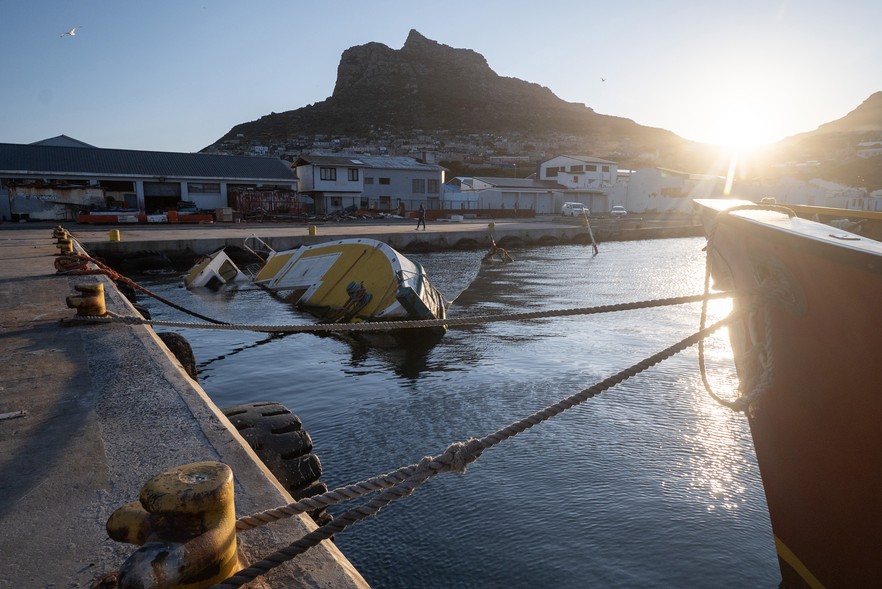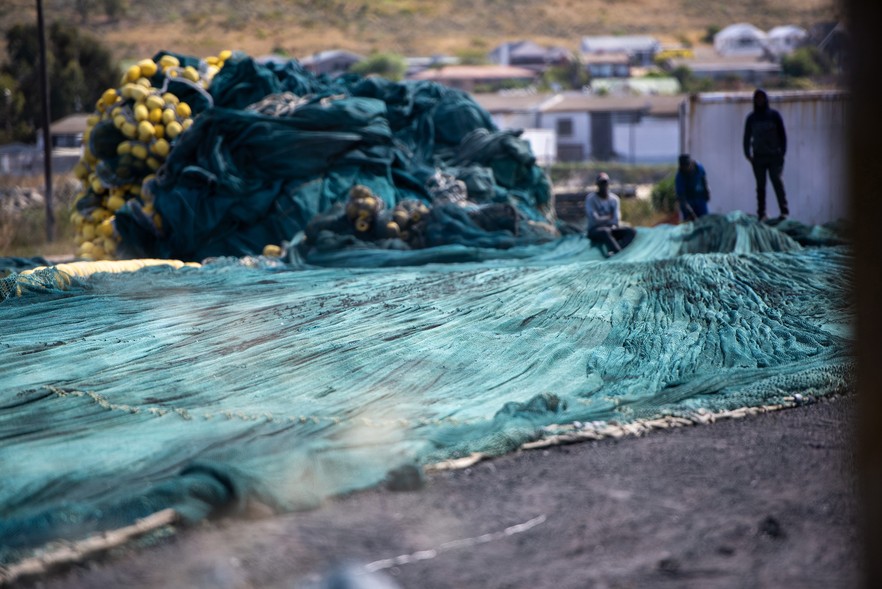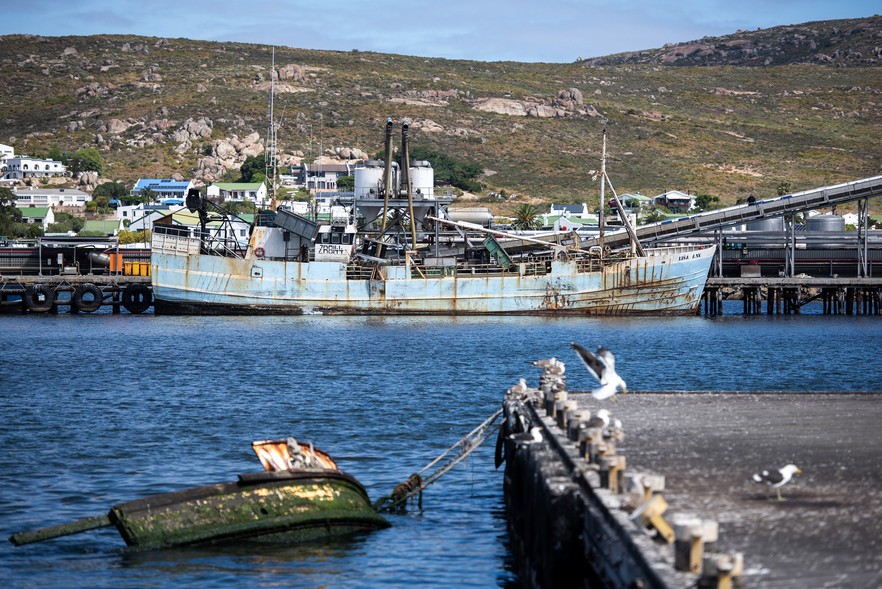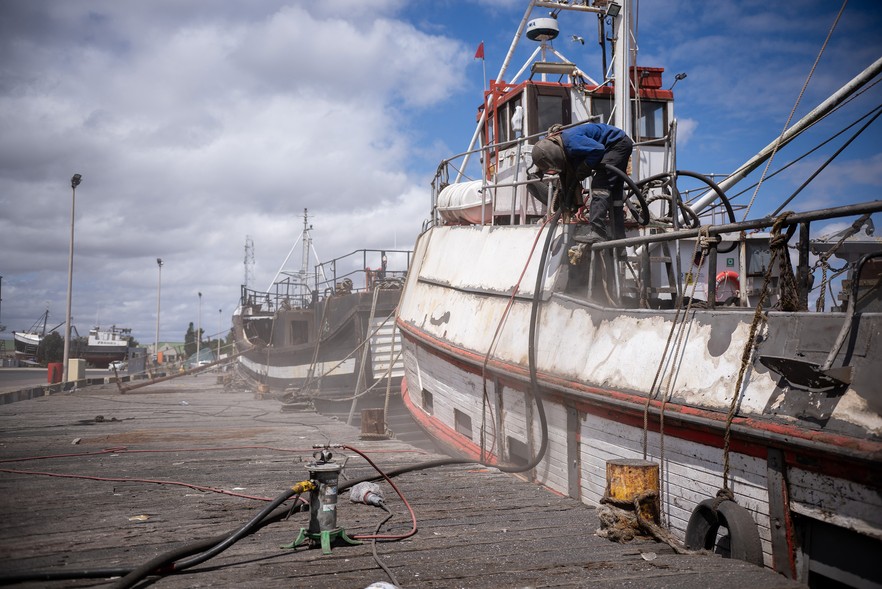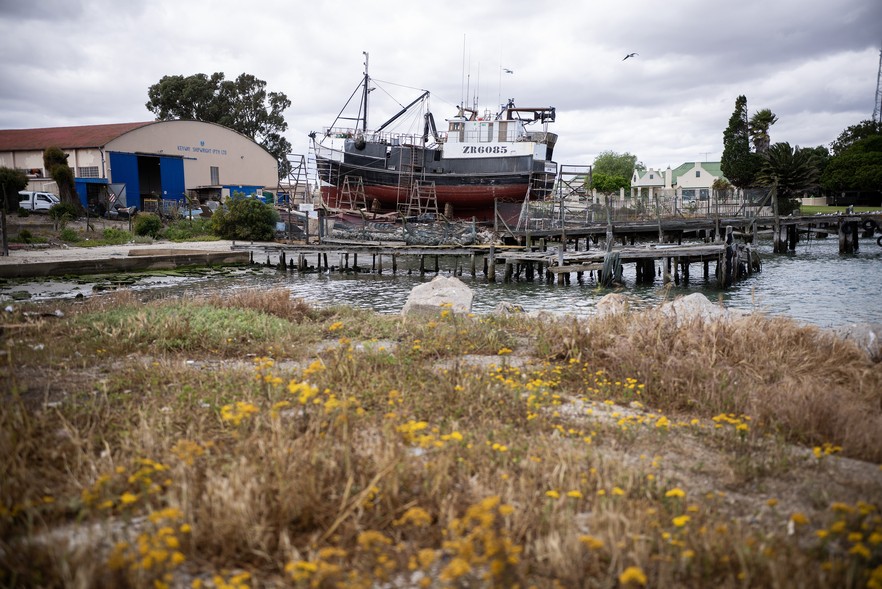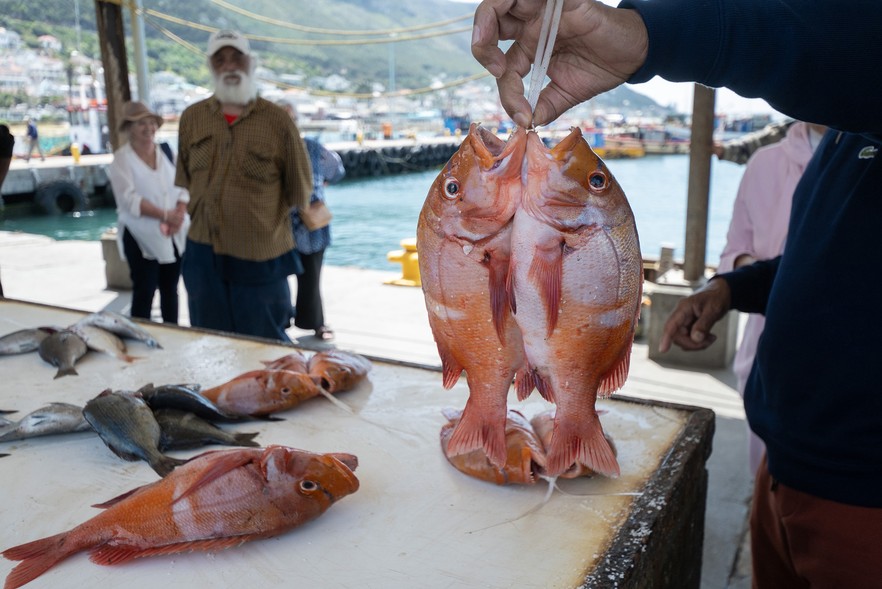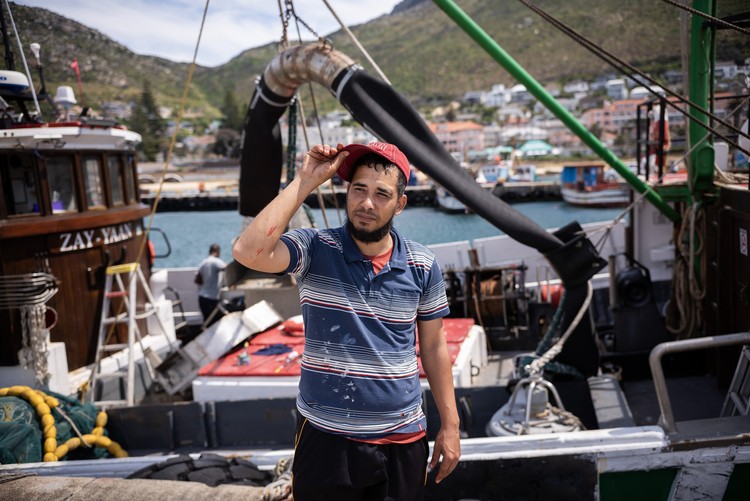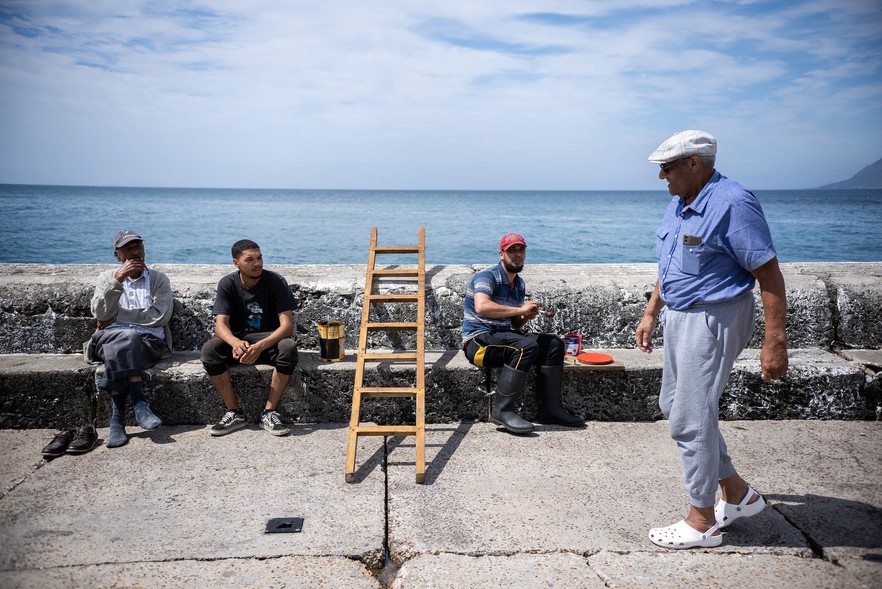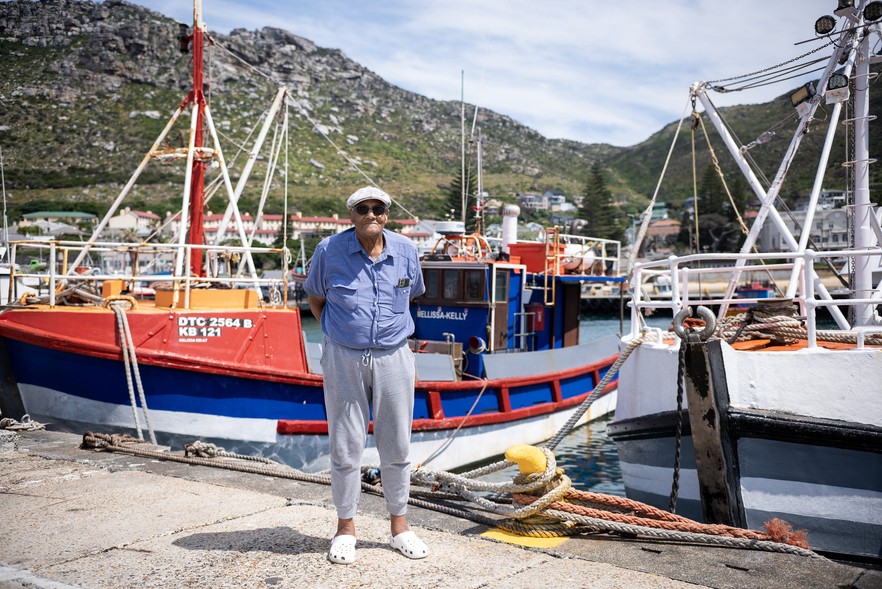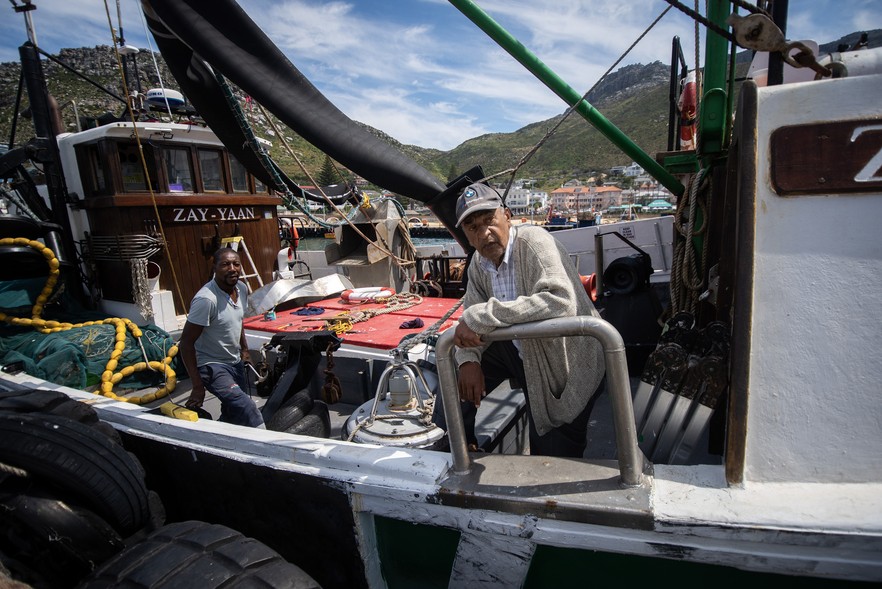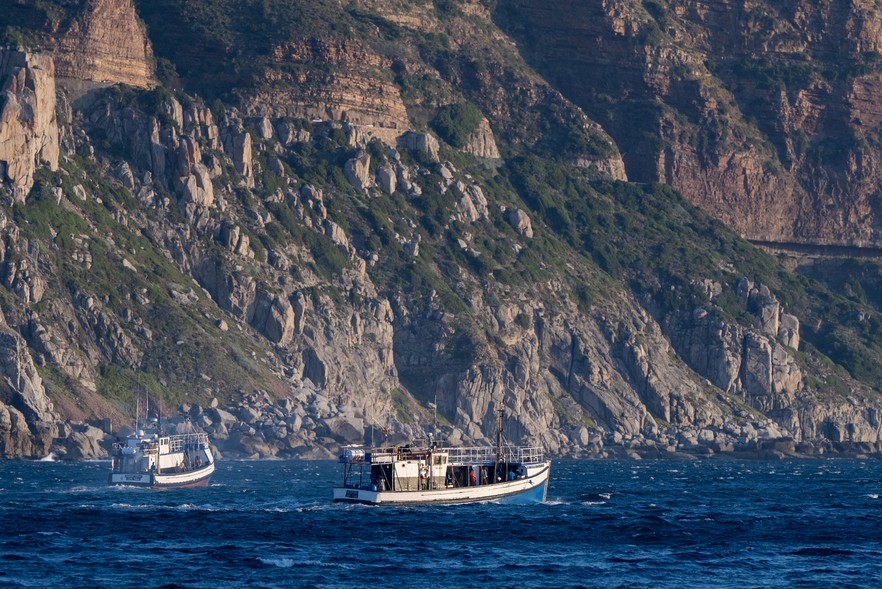In photos: Fishers battle to survive strict quotas
“Die blou see is onse oesland” (the blue sea is our harvest land)
With the fishing industry in decline, boat owners and fishing businesses are unable to maintain vessels. Many, like this one in Hout Bay, lie submerged along the quay. Fishers say the government has forgotten about them and has let critical harbour and port infrastructure collapse. But the fisheries department is currently fixing small harbours in the Western Cape and salvaging sunken vessels. Photos: David Harrison
Generational fishermen from villages and towns along the South African coast were once able to earn a decent living and feed their families by fishing.
But as fish stocks have depleted, the government has had to introduce strict quotas and permit conditions. Some areas along the coast have been closed for fishing to protect pelagic fish stocks for endangered penguin colonies.
Purse-sein (a type of fishing net) fishers have already met their quotas for the year and have been unable to work for months.
Workers repairing a net in St Helena Bay harbour. The purse-seine fishing industry has been in decline in recent years due to depleting pelagic fish stocks, resulting in strict quotas, particularly for pilchards and sardines.
Boats and some of their crews have not been able to work for months because their quotas for pelagic fish species have already been met for the fishing season.
Workers sandblast a fishing vessel at the Laaiplek harbour near Velddrif on the Cape West Coast. Boats are undergoing maintenance during the downtime. Boats must pass annual surveys of seaworthiness to be allowed to put to sea. The constant upkeep is a massive cost.
An old fishing boat on a wooden dry dock for maintenance at the Laaiplek harbour. Many fishermen have not worked for months. Larger fishing companies are also feeling the pinch, with possible factory closures along the coast in Gansbaai, Mossel Bay, and St Helena Bay.
The coastal town of Kalk Bay, Cape Town, is but one example of how much has changed.
“The boats are just lying on the quays. In my grandfather’s day, the boats were out fishing for any species every day, weather permitting. Our people were able to make a living. Even if it wasn’t a lot, at least they would eat,” says boat owner Kobus Poggenpoel.
“Since the government stopped purse seine fishing and closed False Bay to all net fishing, the fishermen moved up the coast to Hermanus and Gansbaai, and then to Mossel Bay. Today, the Kalk Bay fishing village is dormant; the government seems more interested in tourism.
“The people come and they like our boats. They’re colourful. They like photographing them and painting them. But that doesn’t help us pay the bills, the crew fees, the slip fees, the maintenance and upkeep of these boats. We do that without any help from the government.”
The harbour’s once-bustling fish market and fishmongers are no longer there. Most of the boats are geared for crayfish season, working only between November and March each year, and are moored for most of the year, with their crew going without pay for months.
A fishmonger holds up two Red Roman sea bream at Kalk Bay harbour. The small catch just unloaded from a ski-boat at the quay is a far cry from the once bustling fish market that existed at Kalk Bay harbour. Many generations of fishers worked every day from Kalk Bay and were able to raise their children. But today, with declines in fishing stocks, harbours like Kalk Bay focus more on tourism.
Obaide Clarke stands in front of the purse-seine fishing boat that he and his family work on, moored in Kalk Bay harbour. “My whole schooling, whatever clothing I’ve had or have on now - everything comes from work out of the sea. Hopefully, I can take over from my grandfather if the government allows and grants us something to go forward, so I can go to college and become a captain like my grandfather. That is my goal, that is my passion, that is my dream.”
Boat owner and Kalk Bay fishing industry legend Kobus Poggenpoel (right) walks along the quay, greeting skipper ‘Beenie’ Emandien (left) and his two grandsons Laeeq and Obaide. Kobus and Beenie grew up fishing in False Bay with their fathers and grandfathers. Kobus’ family lived in the Kalk Bay village until they were forced to move to Ocean View in the 1960s under the Group Areas Act.
Kobus Poggenpoel, born in Kalk Bay, grew up in the 1950s and 60s, fishing with his father and grandfather out of the small harbour every day. But the industry has become increasingly regulated, with quotas getting stricter over the decades to prevent over-fishing and protect seabirds.
Skipper ‘Beenie’ Emandien (right) and his marine engineer, Michael Museve (left), do maintenance work on a fishing boat moored in Kalk Bay harbour. Due to strict quotas, ‘Beenie’ & his crew were last able to fish in April and got their last paycheck in May. They are hoping to get a licence to fish in November, which would make the end of the year a bit easier.
Two long-line fishing boats head out from Hout Bay harbour below Chapmans Peak. While long-line fishermen continue to work outside of the natural trawl grounds targeting both Kingklip and Hake species, traditional purse-seine fishing has closed for the year as the lowered quota limits were met months ago.
Support independent journalism
Donate using Payfast

Don't miss out on the latest news
We respect your privacy, and promise we won't spam you.
Next: Three spaza shopkeepers shot by extortionists in Phillipi
Previous: Guns, gangs and gold: The battle for Zambia’s riches
Letters
Dear Editor
The battle for survival extends across all sectors of the fisheries, with the exception of the large companies to whom DFFE still panders. It serves the interest of large companies that smaller fisheries sectors continue to fight amongst each other. The small-scale fisheries sector is also plagued with challenges that are difficult to overcome due to allocation processes that cannot yield sustainable livelihoods. Traditional practices that sustained whole communities for centuries are almost non-existent due to changes in legislation and inadequate rights allocations, yet large companies continue to monopolise the high end of the fisheries value-chains, which further impoverishes communities who have now received access to high-value species.
Our fisheries are in a complete mess and the entire fisheries sector (marine, inland and aquaculture) needs a complete rethink and restructuring in order for our people to once again eke out a living and continue their passion as harvesters. Perhaps the most important point to note is the fact that South Africa has never experienced the equitable redistribution of our fisheries' resources.
© 2025 GroundUp. This article is licensed under a Creative Commons Attribution-NoDerivatives 4.0 International License.
You may republish this article, so long as you credit the authors and GroundUp, and do not change the text. Please include a link back to the original article.
We put an invisible pixel in the article so that we can count traffic to republishers. All analytics tools are solely on our servers. We do not give our logs to any third party. Logs are deleted after two weeks. We do not use any IP address identifying information except to count regional traffic. We are solely interested in counting hits, not tracking users. If you republish, please do not delete the invisible pixel.

